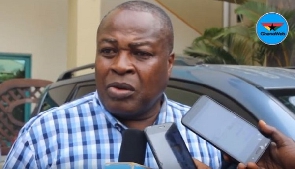BLAME GOV’T & BoG
…For Embracing Dollarization
By Newman Dotse
Ghanaians should blame the government and Bank of Ghana (BoG) for embracing the dollarization concept that is currently diminishing the strength of the cedi that looked so strong few years ago.
Instead of making strong policy that will make Ghanaians stick to the cedi and use it in major transactions internally, they have allowed Ghanaians to adopt the dollar as the preferred currency in most of their internal transactions, thus bringing about the sudden upsurge of the dollar which has rendered the cedi weak.
The officials of Bank of Ghana and the ruling party should know there are some substantial drawbacks to adopting a foreign currency.
In a fully dollarized economy, the central bank loses its role as the lender of last resort for its banking system. While it may still be able to provide short-term emergency funds from held reserves to banks in distress, it would not necessarily be able to provide enough funds to cover the withdrawals in the case of a run on deposits.
Another disadvantage for a country that opts for full dollarization is that its securities must be bought back in U.S. dollars. If the country does not have a sufficient amount of reserves, it will either have to borrow the money by running a current account deficit or find a means to accumulate a current account surplus.
Because a local currency is a symbol of a sovereign state, the use of foreign currency instead of the local one may damage a nation's sense of pride.
Any country that embraces the dollarization concept loses right to control its own monetary policy and the Central Bank of that country forgoes its right as a lender of last resort for its financial network.
Today, rent rates are quoted in U.S dollars instead of the cedi, hotels operating in the country quote their rates in dollars. In this case, one has to go to the forex bureau or bank to purchase dollars to make payment as if Ghana is America.
We know that companies need foreign currencies to import materials; hence the use of dollar internally should be reserved only for these purposes and not for rental charges and other minor things that could have been taken care of by the cedi.
Today in Ghana, when one puts GH¢2000 and a $1000 on a table and asks a Ghanaian to pick one, the person is likely to pick $1000 even though GH¢2000 is more than $1000 by the current exchange rate. This is how Ghanaians adore and glorify the dollar.
The Ghanaian Cedi exchange rate depreciated by 4.24 percent against the US Dollar during the last month. During the last 12 months, the Ghanaian Cedi exchange rate depreciated by 22.96 percent against the US Dollar. Historically however, from 2009 to 2012, the USD-GH¢ exchange averaged 1.50, reaching a historical high of 1.86 in April 2012 and a record low of 1.39 in May of 2010. The Ghanaian Cedi spot exchange rate specifies how much one currency, the US Dollar is currently worth, as against the GH¢.
Implications of Currency Devaluation:
For a currency to be devalued means that the issuing government has mandated that the price of the currency (in foreign dollars) is lower than it was before. Now, regardless of whether a country has a fixed or flexible exchange rate system, there exists a "true" (we say "equilibrium") exchange rate. The equilibrium exchange rate is the exchange rate at which everyone who wants to sell the currency can find a buyer and everyone who wants to buy the currency can find a seller. By definition, a flexible exchange rate is the equilibrium exchange rate. This is not the case with a fixed exchange rate.
Consider the following analogy. The equilibrium price of a car is GH¢10,000. If the government imposes no restrictions on car prices (i.e. car prices are flexible), then the free market price of a car will be GH¢10,000. Further, there will be no surplus or shortage of cars; everyone who wants to buy a car (at GH¢10,000) will find one to buy, and everyone who wants to sell a car (at GH¢10,000) will find a customer. Now, suppose the government imposes a price floor on cars of GH¢15,000. At the official price of GH¢15,000, many people will want to sell cars, but few people will want to buy cars. There will be a surplus of cars. If the government wants to avoid ending up hip-deep in unsold cars, it will have to buy the extras itself. That is the case with what is happening to the cedi. Initially, government was using its reserves to cushion the cedi and has now run out of dollars; hence it could no longer support it.
In conclusion, the current crisis hovering around the cedi and other economic crises in Ghana are caused by a combination of factors: The government has been ineffective in collecting taxes, which means that the government has to borrow more money to buy and pay for what it needs. In an effort to escape the effects of the economic collapse, investors want to buy strong currencies like the dollar and the Euro and to sell weaker currency like the cedi. The voyage to dollars causes the equilibrium exchange rate of the cedi to fall flat. The Central Bank (BoG) finds itself forced to sell off almost all of its stock of dollars in an attempt to support a now untenable exchange rate. As government runs out of money to buy what it needs and the Central Bank runs out of dollars to support the cedi, two things have been done: (a) the government prints more cedis thus causing internal inflation), (b) the Bank of Ghana devalues the cedi thus causing the government to default on its loans).
To be continued.
Source: The Citizen Newspaper (thecitizen.news@yahoo.com)
+233 27 731 4655 www.thecitizenghana.com
Click to view details



Business News of Tuesday, 8 May 2012
Source: The Citizen Newspaper
















